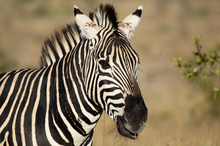Zebras are in the horse family like donkeys but they're not horses. Both Zebras and horses belong to the family Equidae, and the genus Equus, but they are different species. Now an intensive investigation finds that a virus thought to be specific to equidae, zebras in particular, has jumped to polar bears.

Cause of polar bear death = Virus from zebra
Researchers have shown that polar bears were infected with a recombinant zebra-derived Equine herpesvirus that had jumped into other species.
Zoos bring together different animal species that would never encounter each other in the wild. On occasion, this can have unforeseen consequences. When in 2010 at the Wuppertal Zoo one polar bear died and another fell severely ill, zoo veterinarians were at a loss as to the cause of the symptoms.
It has now been shown that the bears were infected with a recombinant zebra-derived virus that had jumped into other species, as reported recently by an international team of researchers led by the Leibniz Institute for Zoo and Wildlife Research in the journal Current Biology. Such species-jumping viruses, if not detected, may threaten the conservation mission of zoos.
Keeping animals from around the world is an important component of the mission of zoos to educate the public and preserve endangered species. To date, it has rarely been considered that such a species mix may have unpredictable consequences in terms of transfer of pathogens among zoo animals. Generally, pathogens adapt to a specific host, but some are opportunistic and can spread to new hosts upon encounter.
The study by researchers from the Leibniz Institute for Zoo and Wildlife Research Berlin (IZW), the Freie Universität Berlin, the University of Sydney and the Zoological Gardens Wuppertal reports such a case of a virus jumping from one species to another. In 2010 at the Wuppertal Zoo in Germany, a female polar bear, Jerka, died of encephalitis despite the best efforts of the zoo veterinarians to save her.
Her male companion Lars exhibited similar symptoms but survived as a result of intervention and long-term veterinary care. Dr. Arne Lawrenz, zoo veterinarian in Wuppertal, describes the situation: "The symptoms were quite shocking, and it was completely unclear at the time what was causing them. We tried to stabilize both animals for days. In the case of Jerka, we were sadly unsuccessful. Fortunately, however, Lars recovered after several weeks and is still alive today."
Encephalitis can be caused by a large number of viruses and bacteria, and identifying novel pathogens in wild animals is a huge, often insurmountable, challenge. However, the intensive investigation of Jerka, Lars and nine additional polar bears yielded a zebra-derived herpes virus as the only candidate pathogen.
A surprising find was that polar bear Struppo, which died years earlier from renal failure in a different zoo with no contact to Jerka or Lars, was also positive for the virus. This indicates that this virus has jumped independently before and may continue to do so.
Interestingly, the virus turned out to be a recombinant, i.e. a combination of the genetic material of two different viruses both found in zebras. It originated when the Equine herpesvirus EHV9 transferred a portion of its DNA into the related EHV1.
While recombination is not uncommon for herpesviruses, the gene region transferred in this case is notable for its role in causing neurological diseases even in horses. Whether this novel virus emerged recently in the zoo zebra population or a long time ago in Africa, and whether the recombination event is responsible for the ability of the virus to jump to new hosts and cause deadly disease are open questions.
